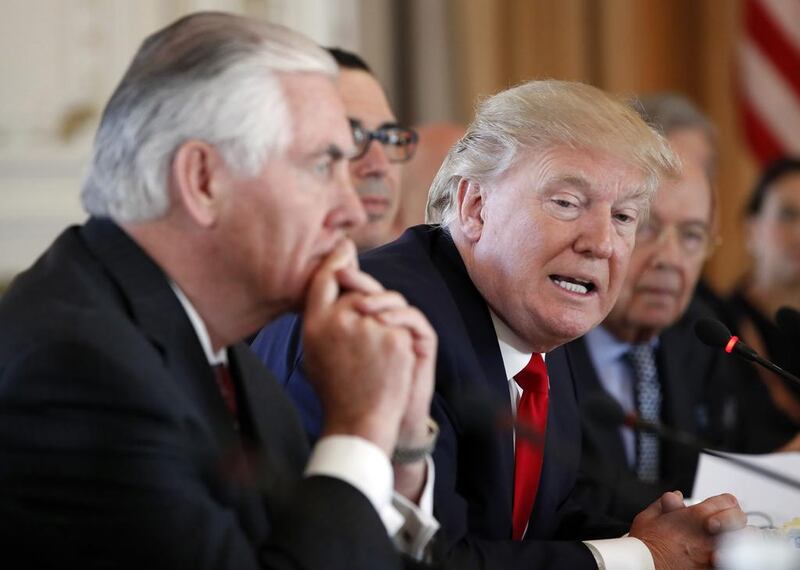Abu Dhabi // Washington’s Gulf partners have enthusiastically supported Donald Trump’s strikes on Syria, in the hope they re-establish both the credibility of US deterrence and leadership in the Middle East and send a strong message to Iran.
Observers, however, acknowledge there are also risks, particularly if the move undermines US-Russia cooperation, strengthens Moscow’s support for Tehran and is not effective in curbing the Syrian regime’s brutality against civilians.
After US cruise missiles struck a Syrian airbase, King Salman of Saudi Arabia spoke by phone with Mr Trump to offer his strong support of the unexpected military action. Senior officials in the UAE, Kuwait and Bahrain soon followed publicly with similar praise.
“US strikes in Syria are a critical step toward holding Assad regime accountable for heinous crime against civilians,” Sheikh Abdullah bin Zayed, Minister of Foreign Affairs and International Cooperation, tweeted on Saturday.
The punitive strikes against the Arab state closest to Iran have raised hopes in the GCC that Mr Trump’s administration has returned US policy towards Iran to one of containment and away from what they saw as the naive engagement of Barack Obama.
Mr Obama’s refusal in 2013 to enforce his own red line on chemical weapons use in the Syria war, after a regime gas attack killed more than 1,000 people was, from a Gulf perspective, a key catalyst for his turbulent relationship with traditional US partners in the region.
For the time being, Mr Trump and his national security advisers have dissipated much of the negativity that led many in the region to question US commitments. Friday’s missile strikes followed tough rhetoric aimed at Iran and new sanctions over its ballistic missile tests, as well as promised increased military support for the Saudi-led campaign against Iran-backed rebels in Yemen.
“The strikes signal the end of the Obama red lines era, which greatly diminished US deterrent capability in the region, effectively creating a security vacuum,” said Ahmed Al Attar, assistant director of the Delma Institute think tank in Abu Dhabi. “GCC leadership was probably convinced that US security guarantees were not guaranteed under Obama, and that the US would not be interested in helping out when push came to shove.
“Today, however, the Obama red line may have been replaced by the Trump green light,” Mr Al Attar said. “Only time will tell whether in the Syrian context, this is a good or bad thing.”
It is still unclear whether the missile strikes represent a drastic shift in US policy towards Syria or were a one-off aimed at ending chemical weapons use. The decision to strike came just days after a number of senior US officials said Washington would no longer pursue the removal of Bashar Al Assad from power. Since the strikes, the US ambassador to the UN has said her country still supports his ouster, while the secretary of state said defeating ISIL was still Washington’s priority. The national security adviser, HR McMaster, split the difference, saying that the US supported regime change but “we’re not the ones who are going to effect that change”.
Some speculate that their primary aim was to bolster Mr Trump on the domestic political front, where he has suffered a string of setbacks. Former Obama administration officials including John Kerry and Mr Trump’s campaign rival Hillary Clinton have said, with caveats, that they supported the limited strikes, giving Mr Trump the appearance of bi-partisan support. The decision also countered the impression that Mr Trump is beholden to Moscow, despite the ongoing FBI investigation into possible collusion between the Kremlin and his election campaign.
But for most Gulf countries, the most important outcome is the effect they hope the strikes will have on Iran’s regional calculations, as well as its ability to influence the course of the Syrian conflict.
“The GCC is also likely hoping that the strikes send a message to Assad as well as to Iran and that Tehran’s influence may start to be rolled back or at least halted,” said a western diplomat based in the Middle East.
But whether the message will be received in Tehran as intended is not a certainty, and there are already signs that Mr Al Assad’s two most important allies – Iran and Russia – may align even more closely in the aftermath.
Gulf countries have enhanced their ties with Moscow in recent years and some hope the US and Russia will cooperate more closely in the Middle East. Ultimately, they hope this drives a wedge between Russia and Iran.
“One of the GCC’s primary foreign policy objectives is to bring its friends, Russia and the US, together,” Mr Al Attar said. “These strikes may have undermined that.”
There is also the danger that US credibility could actually be weakened by its military action if Damascus does not change its behaviour and is not reined in by its patrons. Already the Syrian air force has reportedly used the Shayrat airfield to bomb Khan Sheikhoun – the town where suspected sarin attacks killed more than 85 people – with conventional weapons.
If the Trump administration is intent on deterring Syria or even Iran, it would have to be committed to escalating its actions to the point that the Assad regime and its allies can no longer bear the costs. How this would be possible with Russia involved in backing Damascus is a key question.
One-off strikes “are often painted as ‘symbolic’, but in reality they usually signal weakness, not resolve,” Dan Byman, a Middle East security expert at Georgetown University, wrote on the Lawfare blog. “The dictator or terrorist on the receiving end suffers little but often looks stronger because they survived a US attack and can boast about their defiance.”
tkhan@thenational.ae





